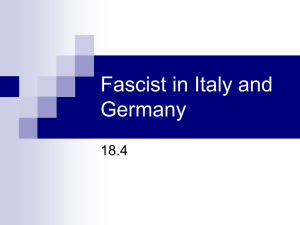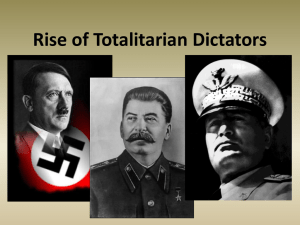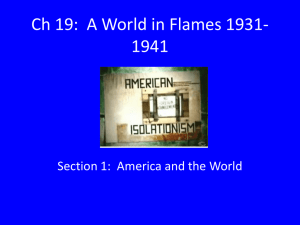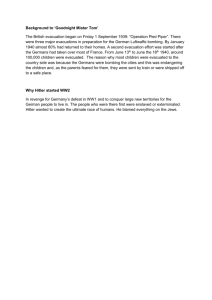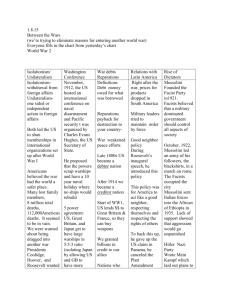Name
advertisement
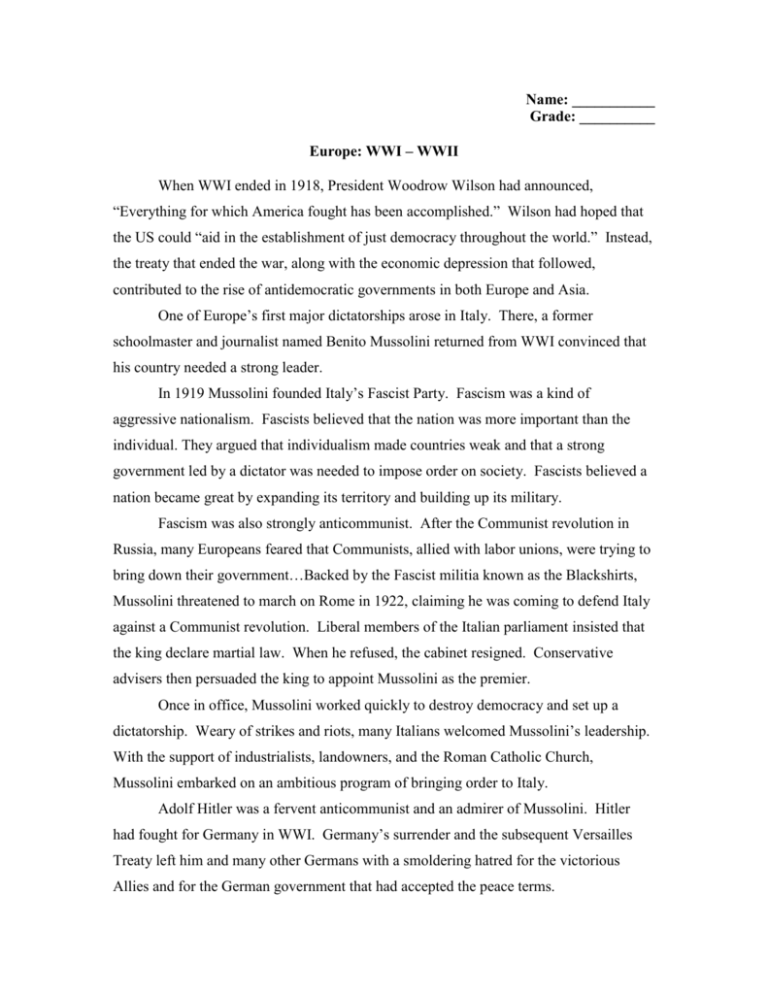
Name: ___________ Grade: __________ Europe: WWI – WWII When WWI ended in 1918, President Woodrow Wilson had announced, “Everything for which America fought has been accomplished.” Wilson had hoped that the US could “aid in the establishment of just democracy throughout the world.” Instead, the treaty that ended the war, along with the economic depression that followed, contributed to the rise of antidemocratic governments in both Europe and Asia. One of Europe’s first major dictatorships arose in Italy. There, a former schoolmaster and journalist named Benito Mussolini returned from WWI convinced that his country needed a strong leader. In 1919 Mussolini founded Italy’s Fascist Party. Fascism was a kind of aggressive nationalism. Fascists believed that the nation was more important than the individual. They argued that individualism made countries weak and that a strong government led by a dictator was needed to impose order on society. Fascists believed a nation became great by expanding its territory and building up its military. Fascism was also strongly anticommunist. After the Communist revolution in Russia, many Europeans feared that Communists, allied with labor unions, were trying to bring down their government…Backed by the Fascist militia known as the Blackshirts, Mussolini threatened to march on Rome in 1922, claiming he was coming to defend Italy against a Communist revolution. Liberal members of the Italian parliament insisted that the king declare martial law. When he refused, the cabinet resigned. Conservative advisers then persuaded the king to appoint Mussolini as the premier. Once in office, Mussolini worked quickly to destroy democracy and set up a dictatorship. Weary of strikes and riots, many Italians welcomed Mussolini’s leadership. With the support of industrialists, landowners, and the Roman Catholic Church, Mussolini embarked on an ambitious program of bringing order to Italy. Adolf Hitler was a fervent anticommunist and an admirer of Mussolini. Hitler had fought for Germany in WWI. Germany’s surrender and the subsequent Versailles Treaty left him and many other Germans with a smoldering hatred for the victorious Allies and for the German government that had accepted the peace terms. Political and economic chaos in postwar Germany led to the rise of new political parties. One of these was the Nazi Party. The party was nationalistic and anticommunist. Adolf Hitler was one of the first recruits. In November 1923, the Nazis tried to seize power by marching on city hall in Munich, Germany. Hitler intended to seize power locally and then march on Berlin, the German capital, but the plan failed and Hitler was arrested. While in prison, Hitler wrote his autobiography, titled Mein Kampf (My Struggle). In the book, Hitler called for the unification of all Germans under one government. He claimed that Germans, particularly blond, blued-eyed Germans, belonged to a “master race” called the Aryans. He argued that Germans needed more living space and called for Germany to expand east into Poland and Russia. According to Hitler, the Slavic people of Easter Europe belonged to an inferior race, which Germans should enslave. Hitler’s prejudice was strongest, however, towards Jews. He believed that Jews were responsible for many of the world’s problems, especially for Germany’s defeat in WWI. After his release from prison, Hitler changed his tactics. Instead of trying to seize power violently, he focused on getting Nazis elected to the Reichstag, the lower house of the German parliament. When the Great Depression struck Germany, many desperate Germans began to vote for radical parties, including the Nazis and Communists. By 1932 the Nazis were the largest party in Reichstag. In 1933 the German President appointed Hitler as chancellor, or prime minister. After taking office, Hitler ordered the police to crack down on the Socialist and Communist Parties. Storm Troopers, as the Nazi paramilitary units were called, began intimidating voters. After the election, the Reichstag, dominated by the Nazis and other right winged parties voted to give Hitler dictatorial powers. In 1934 Hitler became president, which gave him control of the army. He then gave himself the new title fuhrer, or “leader”. The following year, he began to rebuild Germany’s military, in violation of the Treaty of Versailles. 1. Describe how the post-WWI conditions of Europe resulted in the rise of totalitarian dictators.


